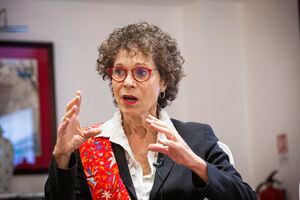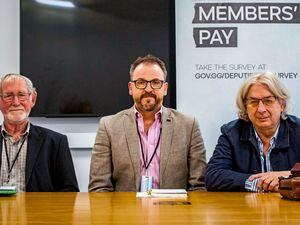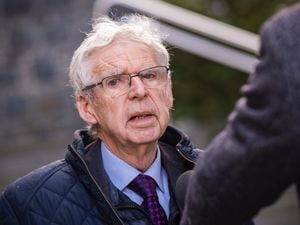‘Be aware of the risks posed by 5G’
PEOPLE need to be made aware of the risks posed by 5G and the prolonged use of mobile phones, said visiting toxicologist and epidemiologist Dr Devra Davis.

Dr Davis delivered a talk on the subject at St James last night, having been brought to the island by the group Say No To 5G in Beautiful Guernsey, which started life on Facebook about a year ago.
She is president of Environmental Health Trust, which is a non-profit organisations that focuses on drawing attention to man-made health threats. She was also a founding director of the Centre for Environmental Oncology and her career has seen her working on disease prevention and environmental health factors.
She has previously raised concerns about the effect of 4G phones and masts on people’s health, and said that there has been a lot of evidence to show that there has been an impact.
Currently there are several court cases in the US being taken against phone companies by the families of people who were early adopters of mobile phones and who they say died of brain tumours caused by prolonged use.
As well as physiological effects on the body, another effect of the excessive use of mobiles is psychological problems, she said: ‘We’re seeing children with depression and unfortunately the rate of suicide has doubled in young children.
‘Certainly the addiction and lack of human interactions which is taking place is all part of this.’
There has also been an increase in brain cancer among children, too.
‘These are complicated issues and I am not trying to imply that the cellphone is the root of all evil.
‘I use phones. I use all the technology there is, I just don’t keep it on my body if I can avoid it.’
She said more information about what people can do to reduce exposure is available on the EHT website.
‘We think it’s possible to practise safer technology.
‘At this stage you’re not going to put the genie back in the bottle and I am not advocating that, but I think people have a right to know that a cellphone is a two-way microwave radio, that it should not be used by children except for emergencies and for limited periods of time and it’s certainly not a toy or a pacifier, and if you keep a phone on your body the radiation gets into you.’
Today she will be meeting local politicians to pass on the information she has, and to urge them to consider that it is the phone industry that is asking them to allow 5G to enable it to market new phones, new routers and so on.
But 5G can also be carried over fibre optic cables: ‘If you want 5G and you’re the fire, police or ambulance service or a business you have it over fibre,’ she said.
Say No to 5G group member David Green said that all it wants is for the island to pay attention to what is happening around the world.
‘Many countries have rules and regulations,’ he said.
‘We’re saying let’s look at what the world is doing and take advice from people like Devra.’
In a joint release from Public Health Services and the Office of Environmental Health and Pollution Regulation, local health officials said they have no plans to impose tougher restrictions on 5G technology than are already in place.
Staff working across both groups have moved to clarify the relevant regulatory mechanisms in place in the island in anticipation of the possible introduction of 5G phone technology to the island.
They have reviewed ‘published research from reputable sources’ to assess its likely effects on human and environmental health.
This review included looking into concerns raised by individuals during the year.
‘Currently we feel there is insufficient evidence of adverse health or environmental effects of electromagnetic field (EMF) radiation connected to the use of 5G frequencies,’ said the joint statement.
‘Therefore, there is no indication to impose tougher restrictions than are currently in place.’
But the bodies said that they will continue to monitor the subject and keep it under review as new evidence emerges or as guidance is updated.
‘Local monitoring and regulation of energy emissions from mobile telephone masts is currently carried out through the independent regulator, Cicra.
‘Our teams have established a good channel of communication with the regulator to ensure we have a mutual understanding of the routine monitoring procedures that are currently in place for 4G technologies and how these would change in the event that 5G was introduced.
‘We are satisfied that this is a robust monitoring process that conforms to international standards.’
Sure’s chief digital officer Justin Bellinger said the company was progressing its work on 5G: ‘Sure is currently conducting an extensive 5G tender process, involving a number of suppliers from around the world, with the intention of launching a trial 5G network across the Bailiwick this year.
‘We want to launch a considered, ubiquitous 5G network aligned with the States of Guernsey’s progressive and ambitious Future of Telecoms policy.
‘Sure fully supports the policy and we intend to bring the most relevant solution to the Bailiwick to support innovation in our economy in an increasingly digital future.’





